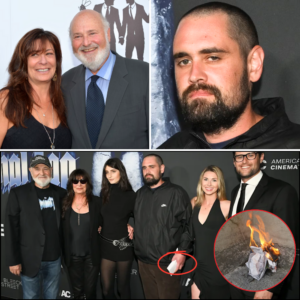In a moment that has sent ripples through Hollywood and beyond, Johnny Depp, now 61, has finally spoken out about one of the most haunting chapters of his life—the tragic death of River Phoenix outside his Viper Room nightclub in 1993. For decades, Depp has carried the weight of that fateful Halloween night, when a young star’s life was cut short at just 23, leaving an indelible mark on the entertainment world. His recent reflections offer a rare glimpse into the emotional toll of the tragedy and the complex bond he shared with Phoenix, reigniting fascination with a story that continues to captivate fans and newcomers alike.
The Night That Changed Everything
It was October 31, 1993, and the Viper Room, a gritty, star-studded nightclub on Los Angeles’ Sunset Strip, was buzzing with energy. Co-owned by Johnny Depp, the venue was a magnet for musicians, actors, and Hollywood’s elite, a place where creativity and excess often collided. That night, River Phoenix, a rising star known for his raw talent in films like Stand By Me and My Own Private Idaho, arrived at the club with his girlfriend, Samantha Mathis, and siblings, Joaquin and Rain Phoenix. He was there to join friends, including members of the band P, which featured Red Hot Chili Peppers’ bassist Flea and Depp himself, for a performance.

But the night took a devastating turn. Around 1 a.m., Phoenix began showing signs of distress. Witnesses later described him trembling and disoriented, his behavior erratic. Despite attempts by those around him to intervene, he collapsed on the sidewalk outside the club. His sister Rain desperately tried to revive him, while his brother Joaquin, then known as Leaf, made a frantic 911 call, his voice trembling with panic. Paramedics arrived, but it was too late. Phoenix was pronounced dead at Cedars-Sinai Medical Center, the victim of a lethal overdose of cocaine and heroin. He was only 23.
The tragedy shocked the world. Phoenix, with his soulful eyes and uncompromising talent, was seen as a generational icon, a performer destined for greatness. His death not only robbed Hollywood of a prodigy but also cast a shadow over the Viper Room and its owner, Johnny Depp, who was thrust into a maelstrom of grief, scrutiny, and speculation.
Depp’s Connection to Phoenix
Johnny Depp and River Phoenix were not close friends, but their paths crossed in the orbit of Hollywood’s vibrant early ’90s scene. Both were young, rebellious talents who shunned the conventional trappings of fame. Depp, then in his late 20s, was riding high as a heartthrob and serious actor, with roles in Edward Scissorhands and What’s Eating Gilbert Grape. Phoenix, five years younger, was carving his own path, blending activism with a magnetic screen presence. Their mutual friends, including musicians like Flea and John Frusciante, and their shared disdain for Hollywood’s glitz, created a loose camaraderie.
The Viper Room was Depp’s passion project, a haven for artists to perform and connect away from the spotlight’s glare. Phoenix, an aspiring musician with his band Aleka’s Attic, was drawn to the club’s raw energy. That night, he had hoped to play alongside his friends, a dream that never materialized. Instead, his presence at the Viper Room became a tragic footnote in its history, forever linking Depp to the loss.
The Aftermath: Guilt and Media Frenzy
In the wake of Phoenix’s death, the Viper Room became a lightning rod for controversy. Tabloids and fans alike speculated about the club’s role, painting it as a den of debauchery where drugs flowed freely. Depp, as co-owner, faced accusations that he bore some responsibility, a narrative that stung deeply. The media frenzy was relentless, with headlines exploiting the tragedy to sell papers, often distorting the truth to implicate the club and its celebrity owner.
Depp, already a private figure despite his fame, was devastated. The loss of Phoenix, a peer he admired, was compounded by the public’s rush to judgment. He later admitted that returning to the Viper Room felt impossible at first, the memory of that night too raw. Out of respect, he closed the club for a week and, in subsequent years, shuttered it annually on October 31 to honor Phoenix. Fans left flowers and tributes outside, a testament to the actor’s enduring impact.
Over time, Depp came to terms with the reality: Phoenix’s death was a tragic accident, not a reflection of the club or its ethos. The drugs Phoenix consumed were his own choice, a fatal misstep in a life marked by both brilliance and personal struggles. Yet the association lingered, a shadow that followed Depp even as he sold his stake in the Viper Room in 2004.
Breaking the Silence at 61
Now, at 61, Johnny Depp has chosen to address this chapter publicly, a decision that has sparked widespread intrigue. His reflections come at a time when he is reemerging in the public eye, following years of personal and professional turbulence. Known for his introspective nature, Depp’s decision to speak out suggests a desire to confront the past and offer closure, both for himself and for those still touched by Phoenix’s legacy.

In his recent comments, Depp reportedly expressed lingering sorrow for Phoenix’s loss, emphasizing the young actor’s extraordinary talent and the tragedy of a life cut short. He has spoken of the emotional weight of being tied to the incident, acknowledging the pain of seeing his club vilified. Yet he also highlighted Phoenix’s humanity, describing him as a sensitive soul who grappled with fame’s pressures in a way that resonated with Depp’s own experiences.
Depp’s words are not just a reflection on loss but a commentary on the broader culture of the ’90s, a time when Hollywood’s excesses often outshone its artistry. He has hinted at the challenges Phoenix faced, including the tension between his public image as a wholesome activist and the private struggles that led to his downfall. By speaking out, Depp seems to be reclaiming the narrative, shifting focus from scandal to remembrance.
The Legacy of River Phoenix
River Phoenix’s death was a wake-up call for many in Hollywood, shining a light on the dangers of addiction and the pressures of fame. At 23, he had already left an indelible mark, with performances that continue to inspire actors and filmmakers. His role as Chris Chambers in Stand By Me captured the vulnerability of youth, while My Own Private Idaho showcased his fearless commitment to complex characters. His activism, particularly for animal rights and environmental causes, added depth to his public persona, making his loss all the more poignant.
For Depp, Phoenix’s death remains a defining moment, a reminder of life’s fragility and the cost of living in the public eye. His decision to speak out at 61 reflects a maturity and perspective gained through years of triumphs and trials. Fans have responded with a mix of curiosity and admiration, eager to hear his unfiltered thoughts on a tragedy that shaped an era.
Why It Matters Now
Depp’s reflections arrive at a time when nostalgia for the ’90s is at an all-time high, with audiences revisiting the era’s music, films, and cultural touchstones. Phoenix, often compared to James Dean for his brooding charisma, remains a symbol of unfulfilled potential, his story resonating with new generations. Depp’s voice adds a fresh layer to this legacy, offering insight from someone who witnessed the tragedy firsthand.
Moreover, Depp’s own journey—marked by blockbuster success, personal controversies, and a recent artistic resurgence—lends weight to his words. His willingness to confront this painful chapter speaks to a broader theme of redemption and healing, themes that echo in his recent work, from his art to his return to acting. For fans, it’s a chance to see a more vulnerable side of a star who has long captivated the world.
A Lasting Echo
As Johnny Depp speaks out at 61, the story of River Phoenix’s tragic death is brought back into focus, a reminder of a talent lost too soon and a night that changed lives forever. The Viper Room, now a relic of a bygone era, stands as a silent witness to that Halloween in 1993, when a young star slipped away. Depp’s words, raw and reflective, invite us to remember Phoenix not just for how he died, but for how he lived—a passionate artist, a dreamer, and a soul who left an unforgettable mark.
For those who loved Phoenix, and for those who admire Depp’s resilience, this moment is a bridge between past and present, a chance to honor a legacy while grappling with its pain. As Hollywood continues to evolve, the story of that night at the Viper Room endures, a cautionary tale and a call to cherish the light of those who burn brightly, however briefly.




